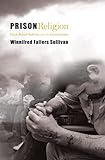Prison Religion : Faith-Based Reform and the Constitution / Winnifred Fallers Sullivan.
Material type: TextPublisher: Princeton, NJ : Princeton University Press, [2011]Copyright date: ©2009Edition: Course BookDescription: 1 online resource (320 p.)Content type:
TextPublisher: Princeton, NJ : Princeton University Press, [2011]Copyright date: ©2009Edition: Course BookDescription: 1 online resource (320 p.)Content type: - 9780691152530
- 9781400830374
- 344.730356
- KF228.A653 S85 2009
- online - DeGruyter
- Issued also in print.
| Item type | Current library | Call number | URL | Status | Notes | Barcode | |
|---|---|---|---|---|---|---|---|
 eBook
eBook
|
Biblioteca "Angelicum" Pont. Univ. S.Tommaso d'Aquino Nuvola online | online - DeGruyter (Browse shelf(Opens below)) | Online access | Not for loan (Accesso limitato) | Accesso per gli utenti autorizzati / Access for authorized users | (dgr)9781400830374 |
Frontmatter -- Contents -- Acknowledgments -- Introduction -- CHAPTER 1. The God Pod -- CHAPTER 2. A Prison Like No Other -- CHAPTER 3. Biblical Justice -- CHAPTER 4. The Way We Live Now -- CHAPTER 5. Beyond Church and State -- Conclusion -- Notes -- Bibliography -- Index
restricted access online access with authorization star
http://purl.org/coar/access_right/c_16ec
More than the citizens of most countries, Americans are either religious or in jail--or both. But what does it mean when imprisonment and evangelization actually go hand in hand, or at least appear to? What do "faith-based" prison programs mean for the constitutional separation of church and state, particularly when prisoners who participate get special privileges? In Prison Religion, law and religion scholar Winnifred Fallers Sullivan takes up these and other important questions through a close examination of a 2005 lawsuit challenging the constitutionality of a faith-based residential rehabilitation program in an Iowa state prison. Americans United for the Separation of Church and State v. Prison Fellowship Ministries, a trial in which Sullivan served as an expert witness, centered on the constitutionality of allowing religious organizations to operate programs in state-run facilities. Using the trial as a case study, Sullivan argues that separation of church and state is no longer possible. Religious authority has shifted from institutions to individuals, making it difficult to define religion, let alone disentangle it from the state. Prison Religion casts new light on church-state law, the debate over government-funded faith-based programs, and the predicament of prisoners who have precious little choice about what kind of rehabilitation they receive, if they are offered any at all.
Issued also in print.
Mode of access: Internet via World Wide Web.
In English.
Description based on online resource; title from PDF title page (publisher's Web site, viewed 30. Aug 2021)


